- Skip to main content
- Skip to primary sidebar

Writing Tips Oasis - A website dedicated to helping writers to write and publish books.

10 Top Science Fiction and Fantasy Writing Groups
By Kevin Chan

Are you looking for a handy list of science fiction and fantasy writing groups? Check out the compilation of 10 we’ve put together below.
1. Brooklyn Speculative Fiction Writers
Located in Brooklyn, New York, Brooklyn Speculative Fiction Writers is a writing group that supports committed writers of various genres of speculative fiction, including science fiction, fantasy, as well as urban fantasy, slipstream and horror, among others. The group also maintains a Facebook group and a podcast, the Kaleidocast, which presents certain science fiction and fantasy stories from member writers.
Prospective group members have an opportunity to connect with some of the 100+ group members of Brooklyn Speculative Fiction Writers. Meetings take multiple times a week, both in person and online. Specific information regarding writing group meetings is available for writers who join Brooklyn Speculative Fiction Writers’ private Meetup.com webpage.
Plan a visit to Brooklyn Speculative Fiction Writers.
2. DC Speculative Fiction Writers’ Group
DC Speculative Fiction Writers’ Group is a writing group based in Washington, D.C. Run through a private Meetup.com webpage, DC Speculative Fiction Writers’ Group has over 1,000 active members focused on writing different genres within speculative fiction, including science fiction and fantasy.
Writing meetings at DC Speculative Fiction Writers’ Group take place online weekly on Monday evenings. Member writers are also welcome to participate in conversations on DC Speculative Fiction Writers’ Group’s Slack online community, where the writing group hosts virtual events.
Take a look at DC Speculative Fiction Writers’ Group.
3. North Texas Speculative Fiction Workshop
Situated in Grand Prairie, Texas, North Texas Speculative Fiction Workshop is a writing group led by group organizer Alley. The writing group welcomes all speculative fiction writers, including science fiction and fantasy writers, to join them for writing meetings where they can participate in conversations and get advice and education about writing, publishing, marketing and more.
Writing meetings happen every second Saturday evening on Zoom or Discord. Interested science fiction or fantasy writers are asked to reach out to Alley on Facebook messenger, Skype or email ahead of joining North Texas Speculative Fiction Workshop at their writing meetings.
Connect to North Texas Speculative Fiction Workshop.
4. East Bay Science Fiction and Fantasy Writers
East Bay Science Fiction and Fantasy Writers is a writing group that welcomes science fiction and fantasy writers over the age of 18. Writers focused on creating screenplays, novels, short stories are all welcome to East Bay Science Fiction and Fantasy Writers’ writing meetings.
East Bay Science Fiction and Fantasy Writers meetings are currently held entirely online. Meetings take place weekly on Sunday afternoons. Writers can benefit from submitting their work-in-progress for critique by their peers and other member writers. Writers interested in submitting writing for critique must attend at least one meeting first and follow East Bay Science Fiction and Fantasy Writers’ submission guidelines.
Discover more about East Bay Science Fiction and Fantasy Writers.
5. Science Fiction & Techno Thriller Editorial Group
Mesa, Arizona is home to Science Fiction & Techno Thriller Editorial Group, a writing group led by group organizer Stan Elwood. The writing group welcomes writers who are passionate about writing science fiction, science fantasy or techno-thriller stories.
Science Fiction & Techno Thriller Editorial Group’s writing meetings happen every week on Tuesday evenings, usually in person at their normal venue, Jason’s Deli. The format of writing meetings includes time for writers to share their writing with the rest of the group, which can be anything from short stories and query letters to novellas and novels. Non-fiction writing is also welcome.
Contact Science Fiction & Techno Thriller Editorial Group.
6. Science Fiction & Fantasy Writers Group of Jax, FL
Science Fiction & Fantasy Writers Group of Jax, FL is a professional writing group that supports science fiction and fantasy writers in Jacksonville, Florida. The group was established in 2012 and aims to create an environment that helps to support and educate writers and provides opportunities for writers to network and build relationships with other writers.
Writing meetings take place monthly at local venues such as Beaches Regional Library. Alongside monthly in-person meetings, Science Fiction & Fantasy Writers Group of Jax, FL members can benefit from online Facebook discussions and other organized writing activities.
Reach out to Science Fiction & Fantasy Writers Group of Jax, FL!
7. Accio Beer! Writers of Fantasy / Sci-Fi / Fiction Critique Group
Science fiction and fantasy writers in Chicago, Illinois, are welcome to join Accio Beer! Writers of Fantasy / Sci-Fi / Fiction Critique Group. Led by a team of co-organizers, including Cody Frovarp, the writing group welcomes writers who are focused on the genres of science fiction and fantasy of all skill and experience levels.
Accio Beer! Writers of Fantasy / Sci-Fi / Fiction Critique Group runs four in-person and online meetings. Meetings consist of sharing writing with other group meetings and receiving constructive criticism and feedback. Prospective group members are encouraged to reach out directly to Accio Beer! Writers of Fantasy / Sci-Fi / Fiction Critique Group for more details on group times and availability.
Speak to Accio Beer! Writers of Fantasy / Sci-Fi / Fiction Critique Group!
8. World Writers
World Writers is a writing group organized by group leader Fola Fadahunsi. Supporting science fiction and fantasy writers in New York, World Writers welcomes writers at all stages of their career, whether they are professional, amateur or aspiring writers. Information regarding specific meeting locations and times is available to members on World Writers’ private Meetup.com webpage.
World Writers writing meetings happen once a month on the first Tuesday evening. Writers can look forward to connecting with some of their like-minded peers at each meeting and will benefit from conversations, networking and getting feedback on their work-in-progress from other writers.
See what else World Writers can offer you!
9. Fantasy & Science Fiction Writing Group
Based in Arvada, Colorado, Fantasy & Science Fiction Writing Group is a writing group co-organized by a dedicated team of co-organizers, including Rachael Teuschler. Writers, whether they are traditionally published authors, independent authors, and those interested in starting on the path towards writing, are all welcome to join Fantasy & Science Fiction Writing Group.
Writing meetings happen multiple days a week for a number of different reasons, including writing critique and focused writing, at different in-person locations like Great Harvest Bread Co. Fantasy & Science Fiction Writing Group members can benefit from relying on fellow writing group members as beta readers for constructive criticism and support for their writing.
Start a conversation with Fantasy & Science Fiction Writing Group!
10. LittleSpec
LittleSpec is a writing group that provides a supportive group that helps individuals who are writers of science fiction, fantasy, or horror in different media such as film, comics and prose. Readers of these genres are also welcome to join LittleSpec. The Littleton, Colorado-based writing group organizes its activities on its Meetup.com private group.
LittleSpec’s writing meetings are divided between critique sessions and discussions about story writing techniques. Both types of meetings happen twice every month and take place in person at different locations in the area. Meeting topics vary to allow writers to learn about different aspects of the writing process.
Check out LittleSpec!
- What We Offer
- How OWW Works

Become a better writer by joining OWW
Online writing workshop, for science fiction, fantasy and horror, why join oww.
Since 2000, OWW has been helping people become better writers. Our members have made over 1,500 sales to print and online publications, won many awards (including the Hugo), and appeared in Best Of anthologies. Dozens of members have sold novels to major publishers.
Member Testimonials
What oww members say about their workshop experience.
I've been a member for 4 months now and have really enjoyed it. I've tried 2 other SF/F crit sites and have found them sadly lacking when compared to OWW-SFFH. The degree of automation, the wealth of material to review, the wealth of reviewers and the helpfulness of the support staff all mark the site out as hands above the rest. Keep up the good work.... It has helped me improve my work immensely.
The comments and encouragement I received were invaluable in helping me improve my skills. I wouldn’t have gone to Clarion if I hadn’t first gone through the workshop.
OWW was the first online workshop community I found when I was ready to begin critiquing. I have learned so much here, and made lifelong connections. As well, I discovered many more resources through OWW, including workshops and new publications. Thank you all so much for everything you do!
When I decided to get serious about writing, my very first stop was the Online Writing Workshop. It's one of the best decisions I've ever made. I'm not exaggerating when I say it changed my life -- I doubt I'd have a career now if I hadn't joined the workshop.
I think an active membership in OWW is one of the very best investments a genre writer can make in his or her future.
It has been a rewarding experience working with the OWW. I have made friends, improved my writing skills and thoroughly enjoyed the experience. Many thanks to everyone who makes the OWW possible.
The OWW has been more useful for me than any other workshops I've tried--university courses, local and long-distance writing groups, or Clarion West. The ongoing critiquing relationships have been invaluable, and the latest draft of my fantasy novel was far more satisfying to write than it would have been without the feedback I received through the OWW.
I've only been a member of the workshop for a few short weeks, but already I've learned more than in the whole of a three-year creative-writing themed Eng-Lit degree. This place is a godsend.
OWW is the finest online workshop I have found, bar none. The benefit of the feedback from other writers is absolutely invaluable and has already made a noticeable difference in my own writing.
Thanks for this wonderful service which you provide to aspiring authors. I thought before that I knew how to write. The experience of being reviewed by others, and of doing many reviews myself, has been extremely informative and inspiring. I have been humbled, but also spurred on by my contacts with the many people on this site.
What I've gained from this workshop and the people I've met here in the time I've been a member is more than worth [the membership fee] to me. When I started here I knew no other writers, knew nothing about how to go about getting anything published, and was pretty much isolated from any contact with anyone who understood what I wanted to do. Finding the workshop was one of the best things that has ever happened to me. I think I've learned more about how to construct a story and the nuts and bolts of writing from the other members of the workshop than I learned in college.
I heartily believe in the usefulness of online writing workshops (I can't imagine where I'd be without them!), and think that you've all done a simply fanastic job with the new OWW. The DROWW was good--but this one makes the other look an ancient, clunky relic! If the Internet is about the sharing of information and the coming-together of people who would not have met under other circumstances, then I believe online writing workshops are the single best example of how the Internet can improve people's lives, in however great or small a way.
You'll find that when you think about how other people construct their stories, you'll start thinking about your own this way, too. I learn more by doing thoughtful crits than any other trick.
This workshop helps me make my stories the best I can make them, and I'm not planning to give that up.
The more I read/review, the better my own writing gets. From the beginning of a story I can now fix problems before they go down to the computer screen. Review, review, review, review, review, review ad infinitum. Your writing will get better. The better your writing, the better chance you have of getting something published. So, review...
Without the workshop I wouldn't be half the writer I am today--I wouldn't have had anything published, and I certainly wouldn't be helping to run a magazine. This workshop has helped me so much.
My problem is that the style used in fiction writing is very different from that used in my profession, which requires a complex sentence structure that supposedly reflects sophisticated ideas. The OWW has helped so much with this problem--I know I've become a better writer since joining the workshop.
The workshop has been so helpful to me, I can't begin to tell you. I know I have a way to go, still, as a writer, but I'm so much further along than I was when I started. Being involved here has truly made a difference.
I have thoroughly enjoyed this workshop. The members have been helpful as I have attempted to make my craft of writing better. They have given me fresh eyes to see what I might not have seen before, a deeper mind to ponder on the things I have read, and a more colorful vocabulary to describe my thoughts and ideas. Thanks for the opportunity.
This is an excellent workshop; kudos to whoever came up with the idea. All the different opinions given by the variety of people reviewing have already had a large impact on my writing.
I have joined many workshops in the past both online and offline. However, none were as helpful as this. The previous workshops seemed less friendly and forced a person to critique every week otherwise they would be ousted from the workshop. I submitted similar pieces to these workshops; however I was unable to get the advice I needed and could use to improve my writing. This workshop is not only the best I have seen but also one of the most helpful and supportive. Good job!
I just wish this that I had known that this workshop existed a lot sooner. I spent literally years not having any idea what to do to make my stories better. I am so impressed with the fact that other writers will help a person get published. In this competive world, that is a rare thing I think. Already the workshop has shown me what to do to make my writing stronger. How much longer would it have been before I achieved professional status without the workshop?
I have been a hobby writer for better than twenty years now. With a full career in software development, I have not been able to pursue my Language Arts education past the high-school level. This workshop has filled a role of which I have only dreamt. At long last, a way for real-life writers to learn real-life lessons about their hobby or profession. College wastes so much of your time, but this... This is the real thing.
I'm very glad to see the workshop reborn. It is such an encouragement and help to younger writers and to any writers who are new to the genres. It helped me immensely.
I had looked at a lot of workshops to help me with my writing (being a beginner I needed help!) Then i found this one. I found all the comments in the reviews really helpful. I found more flaws in my work than I had ever realised I had. Thanks to this workshop they are now being corrected. It doesn't matter if you are new to writing or not
Since joining the workshop I've seen my writing mature both stylistically and thematically. I shudder whenever I remember the drivel I was pounding out prior to discovering a forum where I could discuss, debate, argue and struggle with a whole host of other writers. Critiquing the works of others is an incredibly expanding exercise. Having my own works 'critted' by other writers of varying skill levels has helped make me focus and hone my craft. This growth process is incredibly addictive, and I've made e-friends with writers I fully anticipate communicating with for the rest of my life.
Member Success Stories

Got Questions?
Let us know if you find a problem with the workshop, or just ask questions not answered on the site. We’ll try to get back to you within a few days—a week at the longest. If you’d rather email us directly, send a message to [email protected] .

- Search forums
Follow along with the video below to see how to install our site as a web app on your home screen.
Note: This feature may not be available in some browsers.

- Writing and Publishing
- Writing Forums
Writing Discussion
- Jan 30, 2014
- Jul 28, 2022
- Teresa Edgerton
- Apr 29, 2007
- Peter Graham
- Jul 22, 2009
- Jun 10, 2024
- Jan 22, 2024
- Jun 16, 2024
- Heijan Xavier
- Jun 19, 2024
- Jun 23, 2007
- Apr 2, 2022
- Jun 12, 2024
- Jun 20, 2024
- Mar 16, 2012
- Jun 1, 2024
- Jun 8, 2024
- May 29, 2024
- Sep 27, 2013
- Jun 6, 2024
- Jun 2, 2024
- 1bitBoolean
- May 26, 2024
- This site uses cookies to help personalise content, tailor your experience and to keep you logged in if you register. By continuing to use this site, you are consenting to our use of cookies. Accept Learn more…

- {{ balance }} Get More
Daily Check-in
Earn points
- Points Mall
Exchange good items
- My subscription
- My community
- Cmmunity points
- Notifications 0 2 28 99+ -->
- Manage Profile
- Boards Login
Donate to SFWA
What Communities Can Do
by Aigner Loren Wilson
Like many writers, when I first started out writing speculative fiction, I felt lost when it came to who to talk to or where to “hang out” with the other cool kids. I knew there were speculative fiction communities out there, ones that were even open and welcoming to little ol’ queer Black me. But they felt out of reach. Almost forbidden. Like I needed to accomplish something just to be considered. So, I formed my own writing community with my friends who also happened to write speculative fiction. Though well-meaning, these other writers weren’t really the community I needed.
You see, they weren’t like me. Though they wrote speculative fiction, their stories were based in predominantly white societies and ideals. My experiences, opinions, and stories were therefore valued or seen as less because I wasn’t working or thinking the way they were. My stories and characters were unrealistic. The sadness and joys I wrote weren’t relatable. I know from being involved in different writing communities and talking with other writers of color that my experience is, or was, the norm. This has led to more writers giving up the pen or board or mic or what have you because they are told so much that their voices and stories are wrong.
Writing may be a solitary act, but reading, publishing, and loving a genre are not solitary. They only happen with the help of those around you, through community. In the beginning before I ever sold a piece, professional or otherwise, the writing communities that helped and encouraged me were all found online, which now, in the age of Covid, is ideal.
Binders Full of Speculative Fiction Writers , a free private Facebook group for women, genderqueer, and non-binary identifying writers is one that I belong to and recommend for writers who identify as the above, looking to meet new writers and connect. It’s a supportive community of writers who are really just there to show their love for working in the genre. Being a part of the Binders group has helped me find new magazines to read and submit to while also opening me up to the diversity of the genre. The group helped me see that there was a place for me and my stories, and that there were readers out there hungry for them.
That’s what good communities do. They uplift and encourage their members, offering advice, resources, and a place to go when it feels like all other places are barred.
Another few science fiction and fantasy Facebook groups that are free and worth checking out are the Asian Science Fiction and Fantasy group , Speculative Literature Foundation , The Sci-Fi & Fantasy Writers’ Guild , and Writing the Other . Not only are these great groups for asking questions, meeting new writers, and learning about the craft, a lot of times “big names” in the field are active members or admins in the group. If you’ve never seen your favorite writers share hilarious and candid posts about their life and craft, it honestly does wonders for imposter syndrome and realizing that your heroes are just other writers that happen to be well-known for their love and commitment to the genre.
For the longest time, I had a bad impression of Reddit. It seemed like literal flaming vessels in an ocean that already felt wide and unwelcoming. So, it took me years to get over those feelings and see that there are a whole hell of a lot of people who just want to connect and learn and showcase their stories. R/Fantasy and R/Science Fiction are both huge communities of writers, readers, and fans who are passionate and knowledgeable about the genre. They even host AMAs from working professionals in the field.
Two paid online communities that are worth checking out are the Science Fiction and Fantasy Writers of America and the Online Writing Workshop for science fiction, fantasy, and horror writers. Once a member of SFWA, you get access to the confidential and closed community boards where members can interact with agents, publishers, and other writers. Members of OWW can give and receive feedback while networking and building their community online. There’s also the Black Science Fiction Society and Codex writers group , which are both free online groups. Codex, however, is a neo-pro market, so there are some requirements to join. It is very similar to the SFWA community, and often, I find myself lost in threads learning about my favorite publishers or writers and along the way learning something about craft and myself.
Without community, I felt lost in the writing world. Finding some online led me to discovering that there’s no right way to publish, to be a science fiction or fantasy author; there is only the shared commitment and love of the genre.
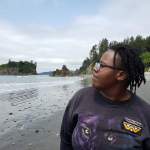
Featured Book
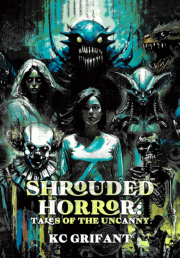
Described as an adult Goosebumps meets Tales from the Crypt, these cosmic and weird stories are about horrors that lie below the surface, ready to bubble up and disturb the veil of our everyday lives.
More Titles by Members
Featured Member

Author Website
Eugen Bacon
Eugen Bacon is an African Australian author of several novels and collections. She’s a British Fantasy Award winner, a Foreword Indies Award winner, a twice World Fantasy Award finalist, and a finalist in other awards.
More Member Authors
Register now for the 2024 SFWA Nebula Conference--A weekend of professional development, panels, and networking for ALL genre writers!
To find the new chatroom:
Log in (The link won't appear until you do)
From the top menu, click Chat
The chat page is displayed. The current chat date should be at the top of the list, older chats will be displayed below.
Click the current chat date and the chat page should load. Chats start at 9:30PM ET Mondays.
-anneliese

- Editorial Services
- How It Works
- Literary Agent Alert
11 Top Writing Communities You Should Join and Why
The life of a writer is pretty solitary, both by design and necessity. While you may find yourself in the neighborhood coffee shop a few days a week just for a change of pace, being a writer can be lonely and quiet.
Well-meaning as they are, your friends and family don’t understand the nuance between conflict and crisis. Try as they might, they can’t relate to the complexity of creating a consistent voice . And, heaven help them, they’ll never get the agony of choosing between traditional and self-publishing .
It’s no wonder that writing and alcohol are familiar companions.
But it’s not happy hour yet. Here’s the good news: you’re not alone. In fact, right this moment, writers just like you are actively participating in writing communities all over the web. It’s time that you meet.
But first, you may be wondering, what’s the point of joining a writing community? I’m glad you asked, because there’s a lot of compelling reasons to join. Let’s break it down:
Have you ever gotten to a point in your story where something just doesn’t sound right, but you can’t figure it out? You don’t want to ask your friends and family for their opinion because, let’s be honest, they’ll just say it sounds great to avoid hurting your feelings (even when you know it doesn’t).
Submitting a difficult piece to your writing community allows you to get honest, actionable feedback while you’re still working on your manuscript.
+Support & Encouragement
Writers understand other writers. They understand what it’s like to fall in love with a character, to struggle with dialogue, and to build entire worlds from scratch. These are your people. You need an environment where you can talk to fellow writers who struggle in the same areas you do. Those people can also help pull you from the mire of despair when the going gets tough, and they’ll motivate you to write those last thousand words.
After you’ve written and edited your book, you can ask your writing community to review your book. Swapping reviews is a popular practice. It’s free and easy to do, and a win-win for both writers.
+Beta Readers
So, what is a beta reader? Beta readers can help catch common, easy to fix mistakes such as detail inconsistencies, that you'll most likely miss after having read over the manuscript 300 times. Often the most important thing beta readers can offer is the indication that something is wrong. They may not know how to fix it or may not offer the right suggestion, but they'll alert you to the fact that X isn't working.
If you’re self-publishing, you’ll need to get marketing savvy quickly. In addition to subscribing to our blog , get thee involved in a writing community where you can learn a lot of interesting marketing tricks and techniques from seasoned pros.
Also, most online writing communities have a dedicated space for writers to promote their books. Share your book with a wider audience.
Here are five easy steps for getting involved in an online writing community. Subscribe to receive this extra resource.
Download your bonus content:
Now that you’re fully convinced on the benefits of becoming an active member in an online writing community, let’s look at the very best ones to join (in alphabetical order) :
1. Absolute Write Water Cooler
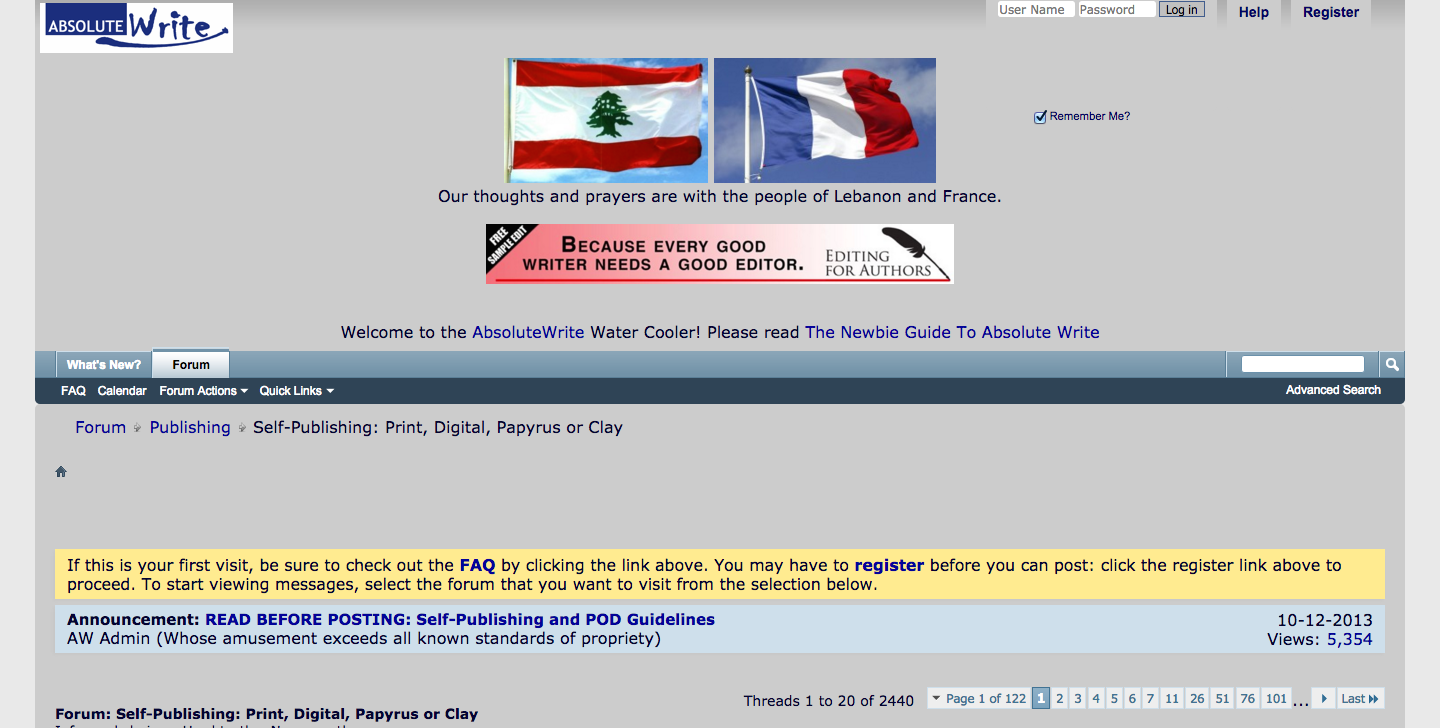
Absolute Writer is a popular and passionate writer’s forum on everything from politics to science fiction (which may in fact be the same thing). It welcomes writers of all genres, including novels, non fiction, screenwriting, and greeting cards.
Why Join? This community is well moderated and extremely popular. You’ll find kindred spirits here.
Popular boards include Ask the Agent , Self-Publishing , and Young Adult .
2. AgentQuery
AgentQuery is a great place to go for critiques and feedback. If you’re further along in the writing process and would love to know how to get an agent, for example, this is the go-to writing community. Check out successful query letters and learn about marketing your book after it’s published.
Why Join? There’s plenty of advice for after you’ve completed your manuscript and are interested in shopping it around. Find out what needs to be done by those who’ve been there/ done that.
Popular boards include Spectulative Fiction , Author and Book Promotion Tips , Agent Submission Process
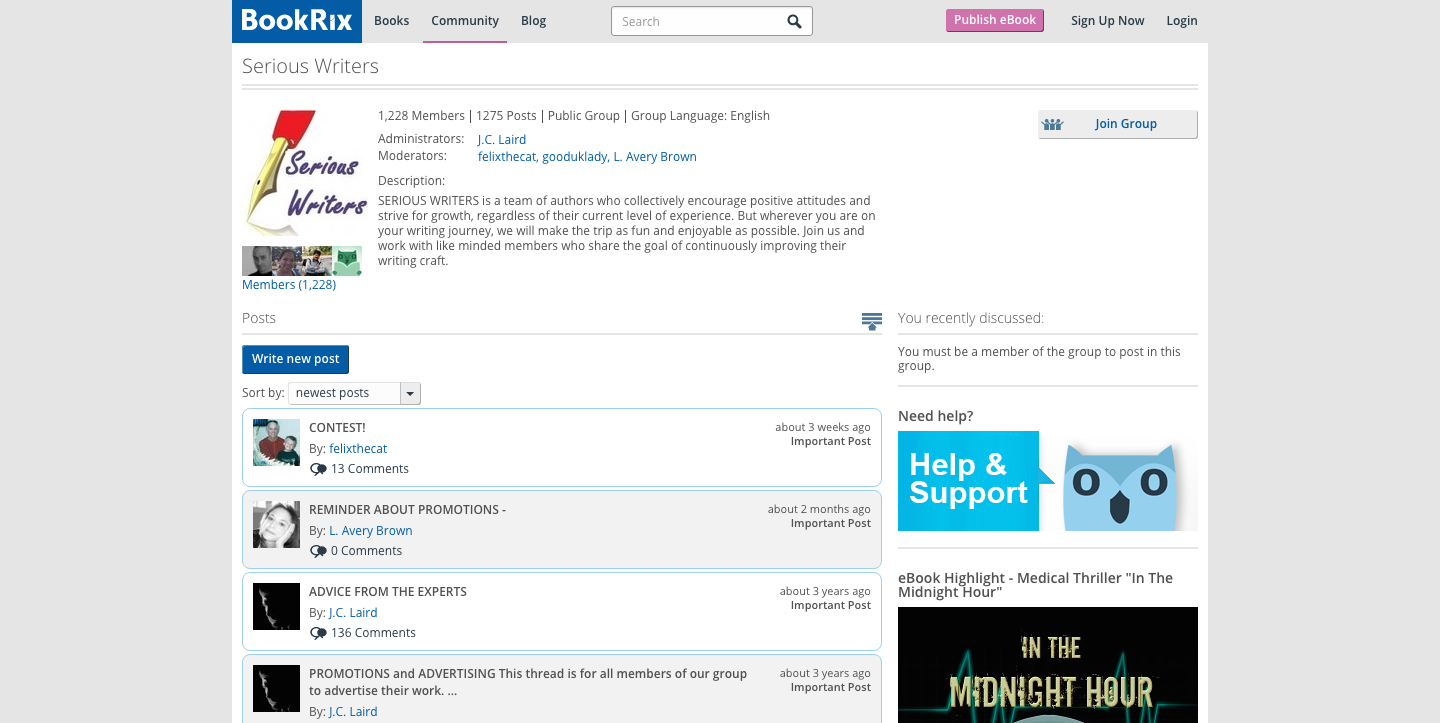
BookRix is a community for independent writers who are interested in self-publishing. While the site BookRix does provide writers with self-publishing help, its community is full of diverse topics that can help any writer improve and commiserate (or both!).
Why Join? You’ll enter an established book community with lots of activity.
Popular boards include Serious Writers , Book Promotion , The Reading List
4. Critique Circle
Established in 2003, Critique Circle is one of the oldest writing communities online. The majority of members are young adults between 21 to 30. As the name implies, members take advantage of critique help, but there’s also a chill vibe for this site. For example, a popular thread at the time of this post is word association.
Why Join? Join for critique help and camaraderie. You may lose hours interacting with other writers in this community, and that’s a good thing every now and then.
Popular boards include Publishing , The Procrastination Lounge (no surprise), Publishing
5. Critters Writers Workshop
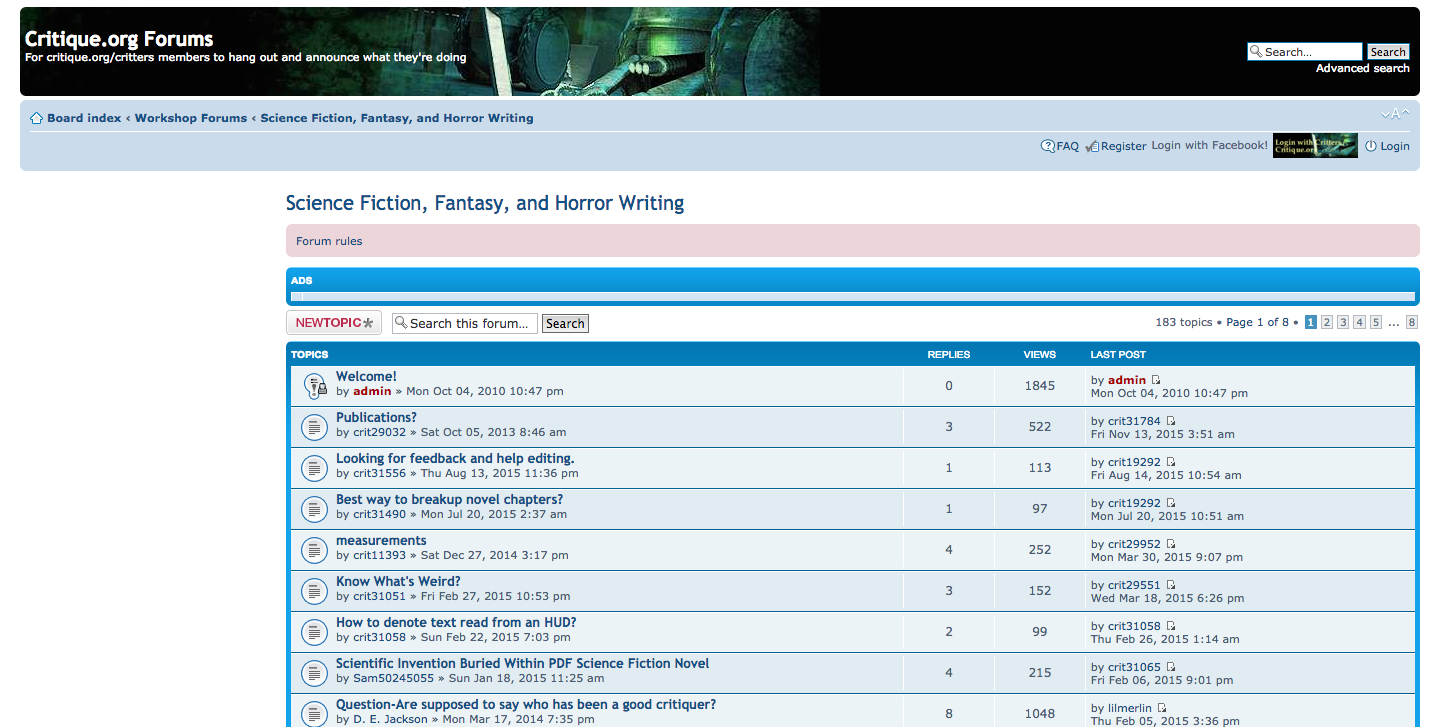
For all you sci-fi, fantasy, or horror writers out there, here’s the group for you. While it’s not the most active community out there, there’s a lot of genre specific nuggets you’ll love to read.
Why Join? This board is a must-join for the sci-fi, fantasy, or horror crowd.
Popular boards include Critique Discussions , Science Fiction, Fantasy, and Horror Writing , Help!
6. SCRIBOPHILE
Scribophile is one of the largest writing communities online. Writers of any genre join to post their writing for critique, give each other feedback on how to improve their writing, and help each other on their journey to publication. Their forums are busy, with over 5.1 million posts at the time of writing, and their members have gone on to be published by the likes of HarperCollins, Macmillan, Penguin Random House, Simon and Schuster, and more.
Why Join? This community is one of the top places to get professional feedback on your writing, and to meet other writers working in your genre.
Popular boards include
[Writing]( https://www.scribophile.com/forums/writing/ )
[Publishing] ( https://www.scribophile.com/forums/publishing/ )
[General discussion: Cool Hang-Out Chill Zone ( https://www.scribophile.com/forums/the-cool-hang-out-chill-zone/ ).
7. Hatrack River Writers Workshop
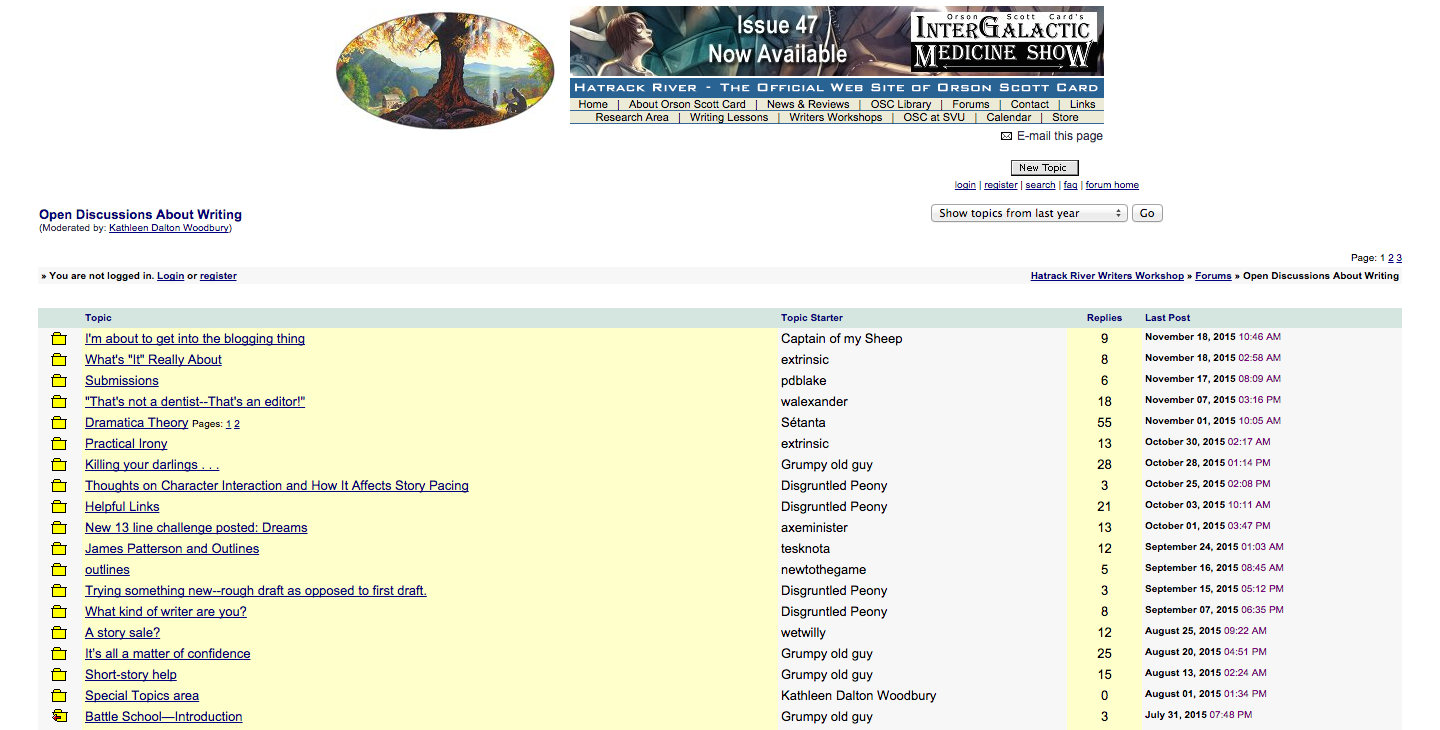
While the Hatrack River Writers Workshop forum has an old school look and feel, there’s plenty of fresh ideas and energetic discussions.
Why Join? Get involved in vibrant discussions about developing character and plot. Learn more about improving your writing from fellow writers.
Popular boards include Open Discussions About Writing , Fragments and Feedback for Short Works , Writing Class
Mibba skews young, but it’s welcoming to any age group. Mibba users create blogs and write narrative posts or stories that can then be critiqued by other members. It’s a great community for young writers who need extra support.
Why Join? This community nurtures young authors by providing an active community, opportunities for collaboration, and peer feedback.
Popular boards include Role-Playing , General , Tips
9. NaNoWriMo
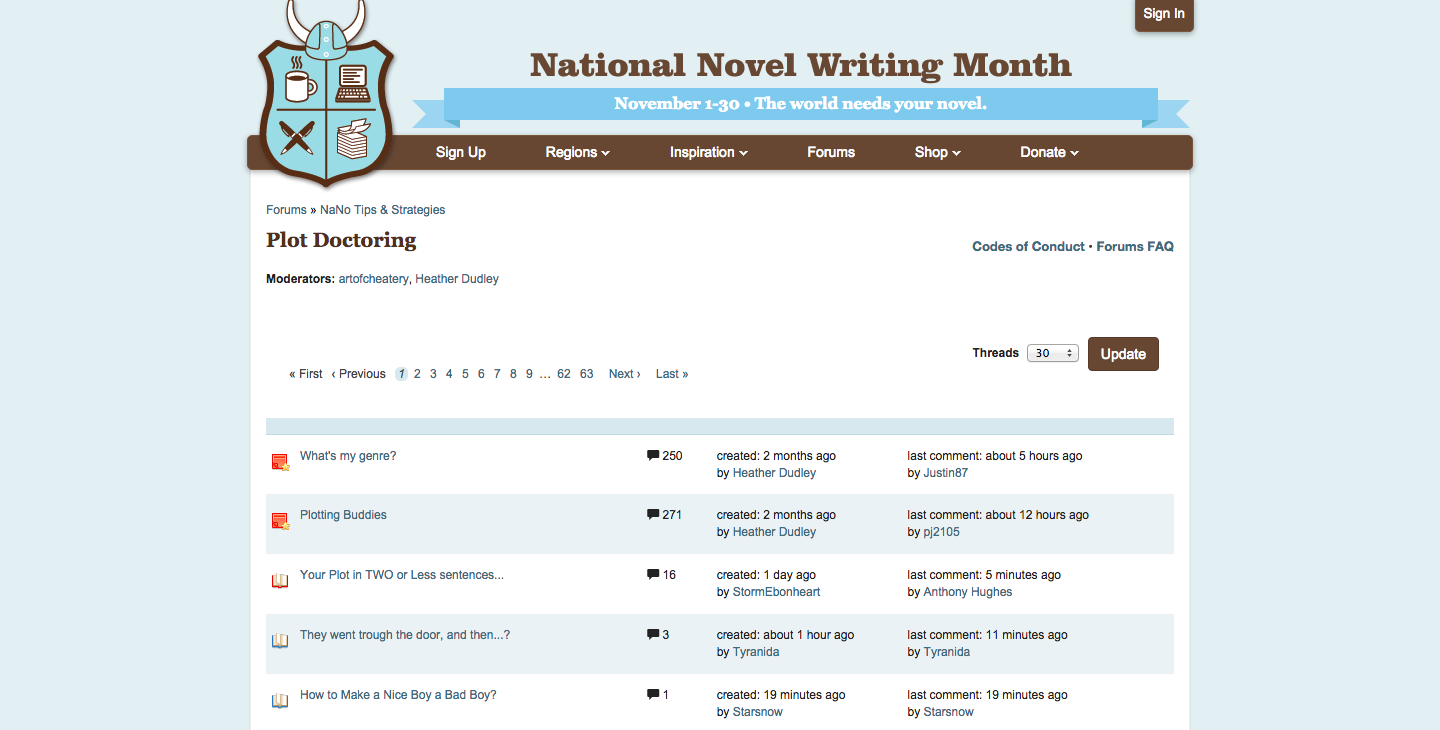
Short for National Novel Writing Month, NaNoWriMo is something of a revolution that challenges writers everywhere to write an entire novel in one month. Crazy, but scores of dedicated fanatics have proven it’s possible.
Why Join? This is a wildly popular community that provides tons of support and writing strategies.
Popular boards include Plot Doctoring , Reference Desk , Writing 101
10. The Next Big Writer
In this community, you’ll find writers who offer professional, no-fluff feedback. There’s not a lot of random activity here, but rather a more somber discourse on writing.
Why Join? Join for professional critique from established writers.
Popular boards include The TheNextBigWriter Basic Group , The Writing Tips & Advice Group , The Fantasy World Builders Group
11. The Reddit Writer's Group
Last but certainly not least is Reddit. Reddit features a subreddit dedicated to write and another to writing . Confusing, right? Just join both. Both subreddits are active and popular, and great for a quick hit of inspiration.

Why Join? Where else can you see this treat: Knowing your character rules and boundaries is essential; here's Chuck Jones' cheat sheet for the Coyote and Roadrunner ?
Popular boards include Write , Writing
Final Thoughts
Joining a writing community is one of the best things you can do to improve your morale and hone your skills. While these communities are completely free, you’ll be amazed at how much value they add to your life.
Editor’s Note: This post was originally published on November 2015 and has been updated for accuracy.
Enter your email for your FREE 7-Day Bootcamp and learn:
- 5 Unconventional Techniques to help you finish your Draft
- The Key to Getting Readers to Care About Your Characters
- How to Master Dialogue, even if you’re a First-Time Writer
- What You Need to Know to Hold Your Reader’s Interest
We've sent you an e-mail, thanks for subscribing!
- Features for Creative Writers
- Features for Work
- Features for Higher Education
- Features for Teachers
- Features for Non-Native Speakers
- Learn Blog Grammar Guide Community Events FAQ
- Grammar Guide
Writing Science Fiction: The Ultimate Guide

Krystal N. Craiker
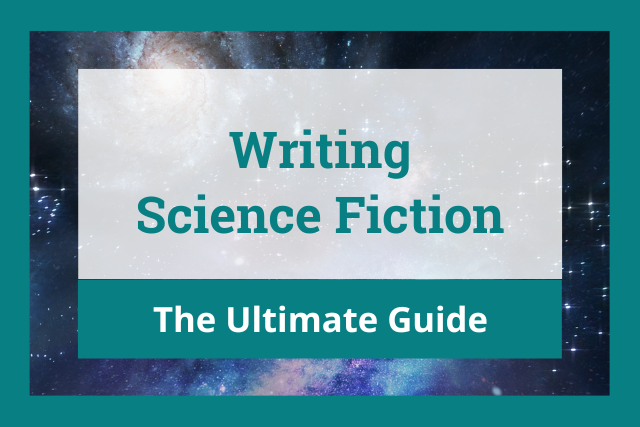
Writing science fiction can feel a lot like exploring the expanse of the universe. It’s a big undertaking in a big genre.
It’s hard to boil down exactly what science fiction is. In fact, the definition of sci-fi is hotly debated among experts and genre enthusiasts. Is it the campy creature features of early cinema or the esoteric, philosophical stories of classic literature?
One thing is certain: science fiction involves scientific elements or principles that are central to the plot of the story.
Whether you’re writing hard science fiction, pulp sci-fi, or something in between, we have everything you need to know to begin writing a great science fiction story.
7 Steps for How to Write a Sci-Fi Novel
5 tips for writing science fiction, how to write a science fiction story.
Writing science fiction doesn’t need to feel overwhelming. If you want to write science fiction but don’t know where to start, try these seven steps for how to write a good science fiction story.
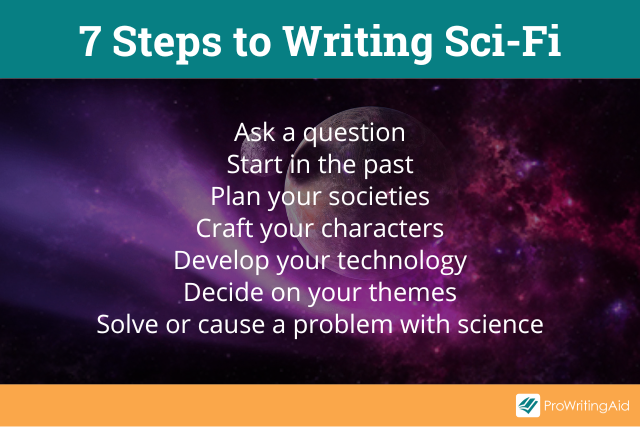
Ask a Question
Every great story starts with a question, and that’s especially true of science fiction. Science fiction novels usually ask some big “what if” question. In fact, it’s this question that drives the entire genre.
Science fiction stories have an element of novum . Science fiction scholar Darko Suvin coined the term “novum,” which is Latin for “new thing,” as a defining element of science fiction.
In essence, novum is a new, fictional idea that is grounded in or reconcilable with reality. It’s the difference between sci-fi and fantasy, and it’s crucial that you find the novum within your story.
Writing Youtube Channel Tale Foundry gives the example of vampires. Vampires as a mythological creature are fantasy.
But what if a virus causes people to need to suck blood to survive? Viruses are real science, so they’re grounded in reality. This is novum.
Ask a big question and answer it with novum. This will give you the most important foundations for your plot.
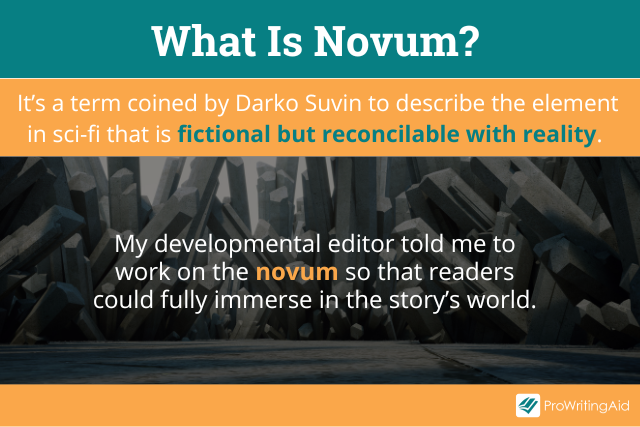
Decide on Your Themes
Every great science fiction novel explores heavy themes. Many touch on race, gender, and class.
Some explore what it means to be human or the indomitable human spirit. Dangers of technology, surveillance, and fascism are other major themes. The possibilities are endless.
Once you have a big question and your science element, ask yourself what themes make sense to explore. A compelling sci-fi story will often tackle a few major themes.
Find themes that work well together.
For example, the themes us vs them and exploration can make for a great space odyssey book full of aliens. Androids and robots are a fun way to tie together what it means to be human with the dangers of technology.
Start in the Past
By this point, you probably have a world and plot forming. But another important part of world building is creating the history or backstory.
Whether your world is about to encounter aliens, or it’s an advanced space-faring civilization, or a virus wiped out most of Earth’s inhabitants, you need to start in the past.
How did your world get to the point it’s at when your science fiction novel begins?
Working backward is the best way to explore this. What did the world look like a year or five years before? A decade before? A century? You’re essentially looking for the causes after knowing the effects.
This information is crucial for establishing a well-developed science fiction world within your story. As you explore this, you may also uncover new themes or plot points to explore.
Plan Your Societies
Now you have the foundation for the world you’ve built, you can start planning the details of your novel’s societies and social structures. The more detail you plan in advance, the easier constructing the plot will become.
Be sure that you keep science and your novum in the forefront as you develop societies for your science fiction book.
Some books are science fiction–adjacent. Perhaps they take place in a dystopian or apocalyptic Earth or a futuristic society in space. But if science is not a guiding force in the world and the story, it is not true science fiction.
Develop Your Technology
For some science fiction writers, developing sci-fi technology is the most enjoyable part of the process. It’s time to turn on your geek mode and create an exciting new reality for your story.
Here are some questions to consider as you develop your science fiction tech:
- Does this technology help or hurt people?
- Who in society has access to the technology?
- How was the tech created? Why?
- How is the tech powered?
- What are the dangers associated with the technology?
- What current, real-world examples are related to the tech?
- How does this technology serve the story themes?
As you answer these questions and others, you may find new plot conflicts or storylines to explore. Let your imagination run wild.
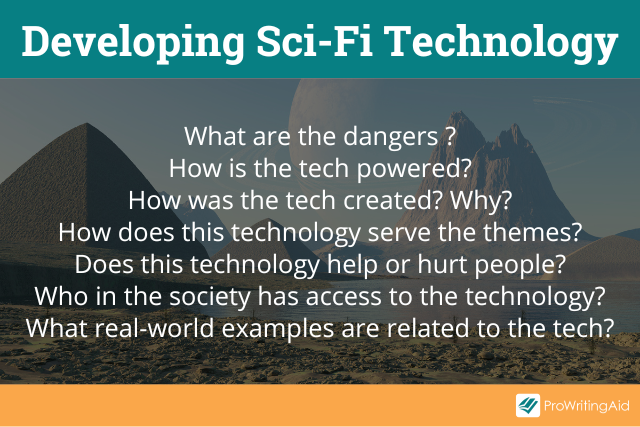
Craft Your Characters
There’s a good chance you have an idea of your protagonist by this point in the writing process. But now that you have an amazing science fiction world built, it’s time to fill it with the rest of your characters.
When you create your protagonists and antagonists, keep your story’s themes in mind. How will their character developments, traits, and flaws help you explore the themes?
Characters are often symbols for themes as well. This is true for both main characters and background characters.
Every character should have goals and motivations that make sense within the framework of the world you’ve built. They should also have relatable flaws that often cause conflict within the story.
Solve (or Cause) a Problem with Science
Your character has a problem. They need to reach their goal and something is in their way. This is where the major conflicts of your science fiction novel lie.
Your plot is how your main characters move toward their goal. When you’re writing a science fiction story, how your characters fail and succeed depends on science.
They may solve problems with a science element. Or the science in your story may be causing their problem or hindering them from achieving their goal. Science can be both, too!
By the time you’ve figured out what role science plays in character development and story arc, you’re ready to write!
Now you know the steps to writing a science fiction story, you’re off to a great start. But there is always more to know!
We’ve gathered five tips for writing science fiction to help you turn your story idea into the next great sci-fi novel.
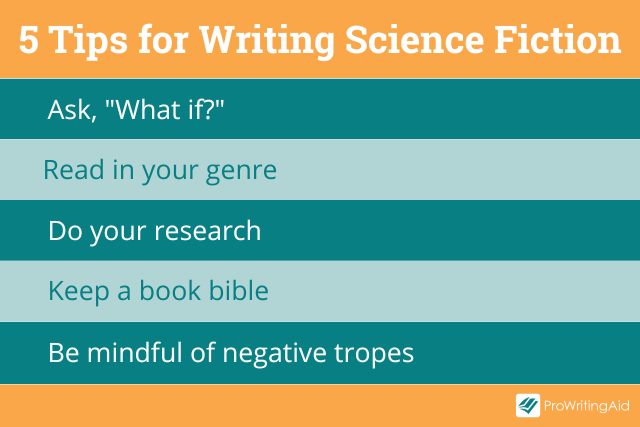
Be Mindful of Negative Tropes
Science fiction has a long history, and not all of it is positive. There are many harmful tropes in science fiction writing , and writers should all strive to avoid doing damage to marginalized people.
Racism is prevalent in both old science fiction and modern works. Many alien race storylines are rooted in racism.
It doesn’t matter if it’s green skin or three eyes: when any race with physical differences is written as more evil, uncivilized, or less intelligent than humans, it’s racist.
Likewise, depictions of oppression—whether aliens, androids, or robots—can also be damaging.
Sexism is also common. Breeder classes or aliens who implant eggs in humans without consent is an outdated and sexist trope.
Likewise, if all the military leaders or scientists are male, you’re alienating a large group of readers.
This is not an exhaustive list. Negative tropes also involve other marginalized communities. We always recommend hiring sensitivity readers to avoid accidentally offending your audience.
Do Your Research
Because science features so heavily in the plot of these stories, science fiction authors must become semi-experts in certain parts of science.
Science is an ever-evolving discipline. To understand how your sci-fi technology exists, you must understand what science currently says about that field.
If you’re writing about genetic engineering, you need a solid understanding of the field of genetics and what genetic engineering is presently capable of. If you’re writing about a virus, you will need to heavily research biology and virology.
Sci-fi readers are often science nerds, and they can tell when your science doesn’t feel plausible.
Keep a Book Bible
With all the research and world building you’ll need to do, it’s easy to lose track of details. This is especially true if you’re planning on writing a science fiction series.
When you’re creating new technologies, species, or classes, you need a reference.
A book bible is a living document full of the details of your world and your characters. You’ll keep track of research notes and backstory elements here. You can also keep character profiles in your book bible.
There are softwares like Campfire and World Anvil that will help you build a book bible.
You can also create a series of documents in a word processor. Note-taking apps and organizational apps can also be customized for book bibles. Find what system works for you.
Ask What If?
Story inspiration for science fiction writing lies in the “what if?”
What if there were genetically modified super-soldiers?
What if you fell into a parallel universe?
What if aliens are terrified of human beings?
Every “what if” question is a plot idea. It might turn into a whole novel, a plot detail, or a supporting storyline.
If you’re looking for inspiration, read about new science discoveries and ask questions. What if? What’s next? What dangers could come from this?
You can ask these questions as you’re world building, too. If you get stuck when creating a new planet or a new technology, start asking yourself what would happen if... ?
When you write science fiction, there’s no such thing as a stupid question. The best questions will lead you down a never-ending rabbit hole of ideas.
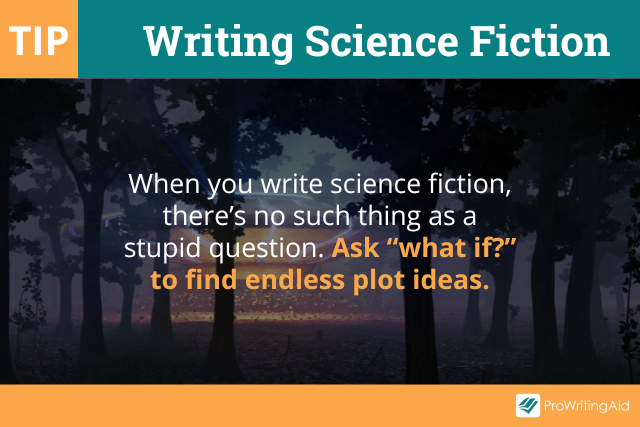
Read in Your Genre
Our last tip goes for sci-fi or any genre. The best way to learn how to write science fiction is to read science fiction.
Read hard and soft science fiction. Read classic and modern sci-fi. Pick up books from authors who come from a different background than you.
You should read stories within your subgenre, but you should also read in other subgenres. Science fiction has dozens of subgenres, from space odyssey to robots to weird sci-fi.
Reading in your genre will help you understand genre expectations, norms, and tropes. It will also let you know what is already out there so you can create a fresh, original idea.
Writing science fiction is a fun way to explore big ideas in a new world. Sci-fi remains a popular genre because readers are always looking for new realities to escape into.
Use these tips for writing science fiction to help you turn your novum into an incredible story. You can also use ProWritingAid to turn your sci-fi story into a masterpiece. Our Style Report will flag non-inclusive language, so you can avoid harmful stereotypes in your characters. Learn more about our inclusive language suggestions .
You can also use our Sensory Report to improve your sensory details. Premium users can compare their science fiction writing against the works of bestselling sci-fi authors like Madeleine L'Engle, Michael Crichton, and Arthur C. Clarke.


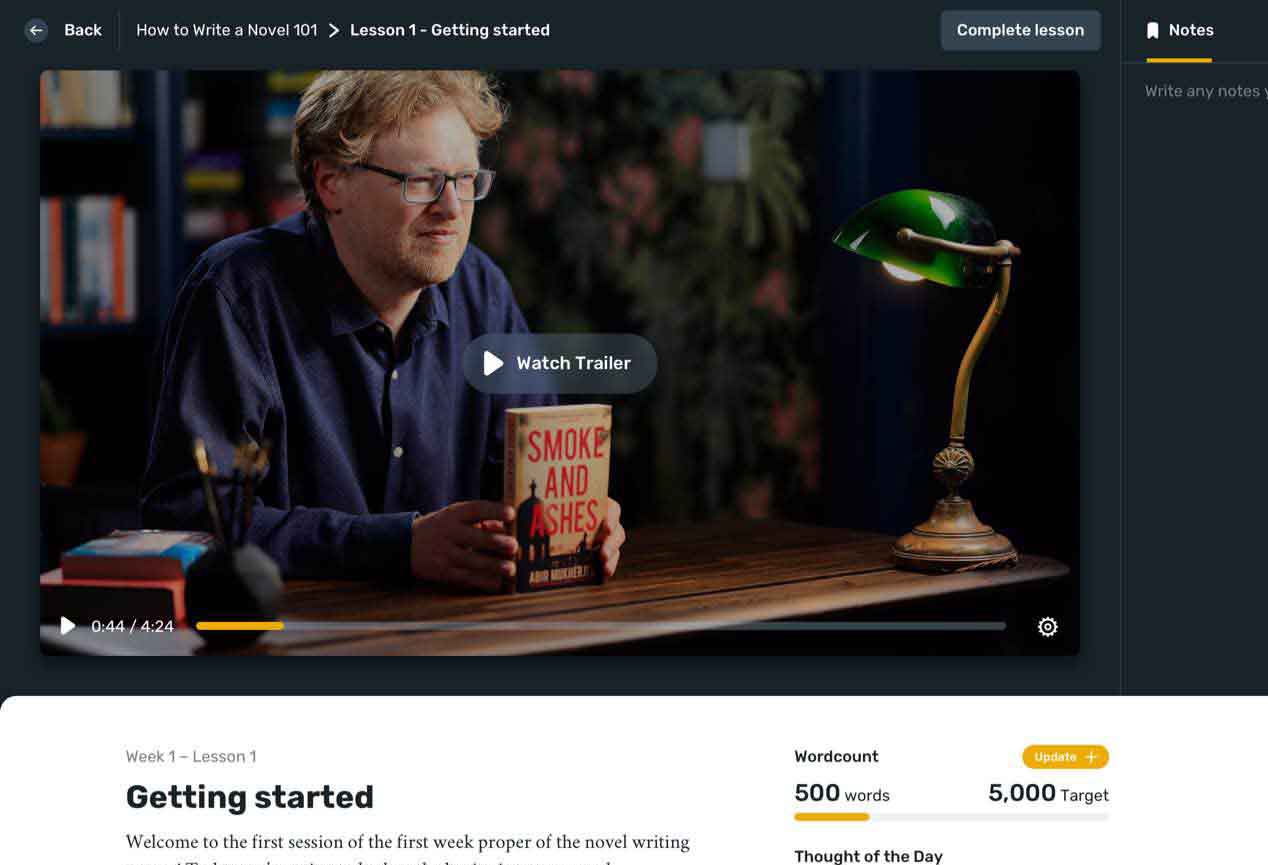


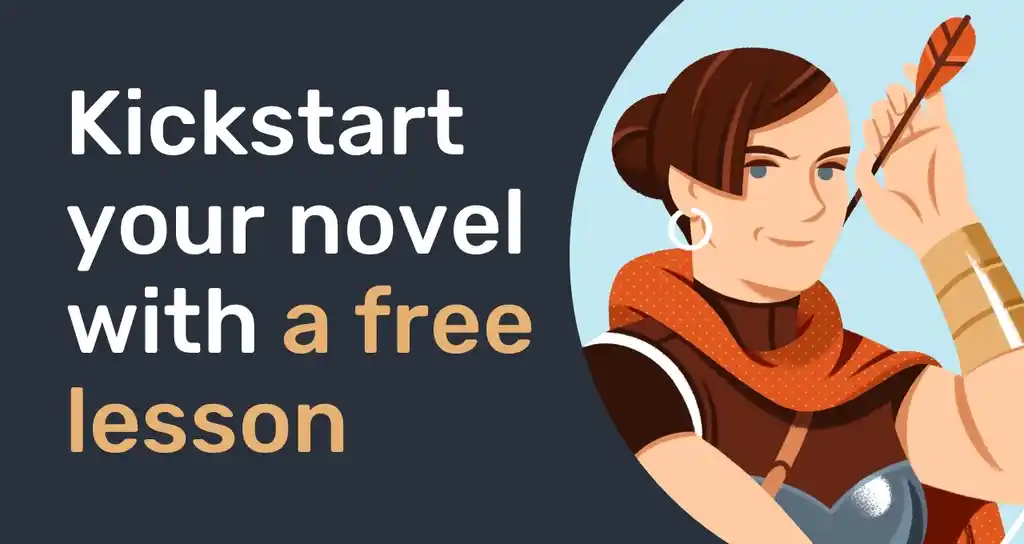



















IMAGES
VIDEO
COMMENTS
SFF Chronicles: science fiction & fantasy community forums. Forums. New posts Search forums. What's new. New posts Latest activity. Log in Register. ... Writing forums to provide help and feedback on writing, including general writing queries, discussions about agents, editors, and publishers, as well as writing resources and a section for ...
Science Fiction & Fantasy Writers Group of Jax, FL is a professional writing group that supports science fiction and fantasy writers in Jacksonville, Florida. The group was established in 2012 and aims to create an environment that helps to support and educate writers and provides opportunities for writers to network and build relationships ...
Writing Discussion. For aspiring writers of science fiction and fantasy to discuss general writing issues. Threads. 7.1K. Messages. 152.1K. What's the view on "bad" language. A moment ago. Astro Pen.
It was a blue, overcast morning. A group of half-drunk fishermen noticed the sky filled with swarming seagulls and went to investigate. They found the horses first, and the fisherman were certain that they must be hallucinating. Then, they discovered the tide had also delivered a man half-buried in the sand.
John Maddox Roberts (25 June 1947 - 23 May 2024), also writing as Mark Ramsay, was a prolific and best-selling science fiction, fantasy, historical, and mystery writer over the course of thirty-five years. He was the author of many novels set in ancient Rome, including Hannibal's Children and its sequel The Seven Hills, and the […]
Top online writing communities. 1. Absolute Write Water Cooler. With over 68,000 members, this is a large and highly active community. Here you can find threads on every genre imaginable, as well as discussions about freelance writing, the publishing industry, pop culture, writing prompts and exercises, and much more.
Become a better writer in the Online Writing Workshop for Science Fiction, Fantasy and Horror. Become a better writer in the Online Writing Workshop for Science Fiction, Fantasy and Horror. Menu. ... OWW was the first online workshop community I found when I was ready to begin critiquing. I have learned so much here, and made lifelong ...
For aspiring writers of science fiction and fantasy to discuss general writing issues. Forums. New posts Search forums. ... For aspiring writers of science fiction and fantasy to discuss general writing issues. 1; 2; 3 ... Community platform by XenForo ...
Science Fiction writing contest. Prize Settings. 10. Scifidea Awards $ 20,000. each. 10 Scifidea Awards, with a prize of $20,000 to each award-winning work; ... 109 people discussing in the community. Browse popular Book Circles Welcome to the Book Discussions . Collect community development proposals ...
Without community, I felt lost in the writing world. Finding some online led me to discovering that there's no right way to publish, to be a science fiction or fantasy author; there is only the shared commitment and love of the genre. Aigner Loren Wilson is a SFWA, HWA, and Codex writer who writes poetry, nonfiction, games, and fiction.
Science Fiction Writers Workshop. To find the new chatroom: Log in (The link won't appear until you do) From the top menu, click Chat. The chat page is displayed. The current chat date should be at the top of the list, older chats will be displayed below. Click the current chat date and the chat page should load. Chats start at 9:30PM ET Mondays.
Popular boards include Critique Discussions, Science Fiction, Fantasy, and Horror Writing, Help! 6. SCRIBOPHILE. Scribophile is one of the largest writing communities online. Writers of any genre join to post their writing for critique, give each other feedback on how to improve their writing, and help each other on their journey to publication.
Science Fiction. This forum is for discussion on specific writing science fiction and science fiction questions. Page 1 of 7.
Here are six steps to get you started. 1. Brainstorm. You're not only writing a science fiction story—you're also drafting an entirely unique storyline in a new setting. That means you have a lot to come up with. Start by brainstorming your fantasy world, characters, and overall theme.
Aug 13, 2019. In this post, learn how to write a science fiction novel from beginning to end, including 4 approaches for the first chapter of your novel, tips for writing about fictional technology, writing dystopian fiction, writing a science fiction series, and more. Whether you want to write about peace-loving aliens or a heartbreaking ...
The best way to learn how to write science fiction is to read science fiction. Read hard and soft science fiction. Read classic and modern sci-fi. Pick up books from authors who come from a different background than you. You should read stories within your subgenre, but you should also read in other subgenres.
r/scificoncepts is a subreddit dedicated to discussing and sharing ideas about science fiction. Not just technology but culture, economics and politics (among others). The subreddit is great because of the discussion you have with other people who are passionate about science fiction. It helped me improve.
A comprehensive directory of 18 science fiction writing classes in 2024, vetted by the team at Reedsy. Filter for the perfect writing course by genre, location, and more! reedsy ... offering a chance to learn in a close-knit community environment. Each week, participants are guided by a different esteemed author or editor, focusing on critiques ...
Ask your writing and editing questions and our team of skilled professionals will provide you with expert guidance. Get inspired by live sessions with renowned authors like Peter James and Jessica Brody. Explore areas dedicated to romance, crime, fantasy, YA, horror, science fiction, and more.
Whatever the case, this course is for you. In 10 weeks, you will learn all about speculative fiction genre conventions through lectures, class discussions, and writing exercises geared toward helping you develop your sci-fi or fantasy novel or short story idea into something you can start writing from the moment the course is done.
40 Sci-Fi Writing Prompts to Supercharge Your Imagination. Abi Wurdeman. May 15, 2024. Science fiction story ideas can come from anywhere. A headline about new technology. The way a lion's mane mushroom resembles a shaggy being from an alien world. The conspiracy theory your aunt won't stop posting about. We live in a big, crazy world full ...
The Guild is an online community dedicated to fostering mutual support between readers and writers of speculative fiction. From traditional novelists to webcomic artists and from science fiction addicts to fantasy buffs, the Guild is here to offer a place of community, camaraderie, and support. Join this Server.
Creative Writing Forums - Writing Help, Writing Workshops, & Writing Community. Home Articles > The Writing Workshop > Novels and Short Stories > Science Fiction. Sort By: Title Start Date Replies
A Writing Room has its roots in the writing classes that novelist Anne Lamott had been teaching for some years, and her interest by the early 2020s in creating a larger on-going community of ...